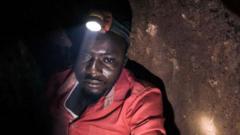In a historic decision, a Brussels court has ordered the Belgian government to pay reparations to five women, now in their 70s and 80s, who were victims of state-sponsored abduction and abuse in the Belgian Congo.
Landmark Reparations Court Ruling for Belgian Congo Victims

Landmark Reparations Court Ruling for Belgian Congo Victims
Five women are awarded reparations from Belgium for historical injustices suffered under colonial rule in Congo.
In a groundbreaking ruling delivered on December 2, 2024, a court in Brussels has determined that the Belgian government must pay reparations to five mixed-race women, now in their 70s and 80s, who were forcibly removed from their parents during the country’s colonial rule over the Congo. The court found that their abduction and the subsequent neglect they experienced constituted a crime against humanity.
These women, identified as daughters of African mothers and European fathers, were taken by Belgian authorities starting at the tender age of two. They were placed in Catholic-run institutions far from their families, enduring severe hardships, including poverty, malnutrition, and abuse. This coercive practice, which had begun in the late 19th century, tragically persisted until well after Congo's independence in 1960.
The Brussels Court of Appeal stated that Belgium had committed “an inhumane act,” recognizing the immense suffering experienced by these women due to their state-sanctioned kidnappings. Each claimant has been awarded 50,000 euros (approximately $52,000) as part of the ruling.
Monique Bitu Bingi, one of the appellants, expressed her relief at the decision, emphasizing that the success of their case not only reflects her struggle but also honors the sacrifices of her Congolese mother. “I feel so relieved,” said the 75-year-old. “The Belgian government took my youth away, and it was something I had to fight for, to explain to the world what happened.”
Belgium's colonial governance from 1908 to 1960 was marked by severe restrictions on social interactions between Europeans and Africans. This environment led to the widespread removal of mixed-race children from their families, with thousands placed in institutions across Congo and a few sent to Belgium for “care.” The recent court ruling marks a significant acknowledgment of these historical wrongs and opens the door for further discussions on reparations for colonial injustices.





















